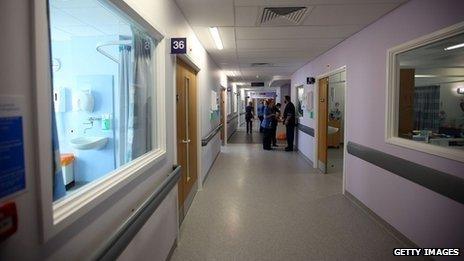Rise in children treated on adult mental health wards
- Published

Data was returned by 51 of the 58 NHS mental health trusts in England
An increasing number of under-18s with mental health problems in England are being treated on adult psychiatric wards, it has emerged.
And many children are having to travel hundreds of miles across the country to receive hospital treatment.
Treating young people in such units should happen only in exceptional circumstances. The Department of Health had promised this would stop by 2010.
The DoH said children and young people's mental health was a priority.
Using Freedom of Information requests, the BBC and online journal Community Care, external found the number of under-18s being treated in adult units was in its hundreds - and rising.
Data returned by 51 of the 58 NHS mental health trusts in England showed that 350 under-18s have been admitted so far to adult mental health wards in 2013-14, compared with 242 two years earlier.
The figures also reveal that 12 under-16s have been admitted so far in 2013-14, compared with just three in 2011-12.
Of 18 trusts that provided out-of-area placement data, 10 had sent children more than 150 miles away for care.
The furthest distance was from Sussex to Bury, Greater Manchester - 275 miles. Sussex Partnership NHS Foundation Trust said it had to make the admission because there was no bed available nearer home.
Data obtained from the Care Quality Commission confirmed that the social care regulator had received an alert about a 12-year-old being admitted to an adult psychiatric unit.
'Inappropriate facilities'
Dr Michael McClure, consultant child psychiatrist and clinical director of children's and adolescents' mental health services at Central and North West London NHS Foundation Trust, said doctors were faced with this problem every week.
"Sometimes we have to make 50 to 100 phone calls around the country looking for a bed. They [young people] shouldn't be shunted around into inappropriate facilities, however much the staff there try to help them," said Dr McClure.
"It may be the first time they've had a breakdown. They need to stay in touch with the people they know and love, and if they're having to move 200 or 300 miles, it's very difficult for the family to stay in touch."
Dr McClure said funding for mental health services had been cut, particularly for child and adolescent services in the community.
"That means there is more difficultly in looking after these young people in the community so there is greater pressure on the inpatient services," he said.
One mother, who did not want to be named, said her 12-year-old daughter was sent from Hull to a psychiatric unit in Stafford, 130 miles away.
"One time she got upset because she didn't want me to go and they had to prise her off me," the mother said.
"They put her in a room and as I was leaving the unit she was shouting out the window, 'Mummy, Mummy, don't leave me, please. Don't leave me, Mummy'.
"It's not just like breaking an arm, it's emotionally draining. And to cope with that as well as having to travel - it's the most difficult thing a mother could ever have to deal with."
'A strange place'
Nicola Mattocks, 16, from London, has been admitted to a mental health ward on four occasions. The first time was when she was 14.
Each time she was sent more than an hour from home, making it difficult for her father - her primary carer - to visit and impossible for her friends.
She said it was "uncomfortable and unsettling" and often frightening.
Nicola Mattocks was 14 when she was placed in a unit up to 30 miles away from where she lived
"I couldn't see my dad as often as I'd like and my friends couldn't get there as it was so far away. I felt quite alienated," she said.
'Unacceptable'
A DoH spokesman said the experience could be "very distressing" for children and their families.
"Our mental health crisis care concordat reinforces the duty on the NHS to make sure that people under 18 are treated in an environment suitable for their age, according to their needs," he said.
He said the DoH had invested £54m to improve services "through better monitoring, sharing best practice and improving access to specialist talking therapies for young people".
Dr Jacqueline Cornish, NHS England's national clinical director for children, young people and transition to adulthood, said treating children with mental health problems in adult settings was "totally unacceptable in the majority of cases".
NHS England is conducting a three-month "rapid review" into the situation, she added.
Marjorie Wallace, chief executive of mental health charity Sane, said: "The traumatisation of young people exposed to often frightening conditions on adult wards is another symptom of the crisis in the mental health system and is the predictable result of both the acute shortage of beds for all ages and the cuts to local community services.
"There is little point in the pledges being given by health ministers if they do not make it possible for trusts to reopen closed units and ensure that young people receive treatment before they become too seriously ill."
Sarah Brennan, chief executive of the charity Young Minds, said the increase in children placed on adult wards was predictable following cuts to early intervention services over the last four years.
"The lack of help early on means we are letting children's problems escalate to serious levels," she said.
"This, alongside the lack of accurate data about the mental health needs of our nation's children and young people, means commissioning has been based on out-of-date, inaccurate information, leading to out-of-date provision."
- Published16 October 2013
- Published9 September 2013
- Published2 January 2014
- Published25 September 2013